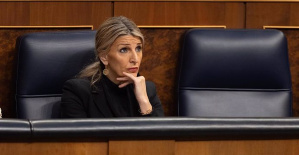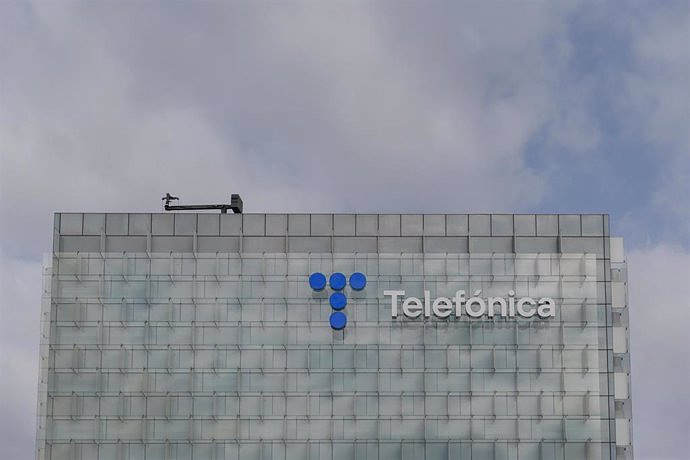The PP and Ciudadanos take the opportunity to criticize "the assault" on the TC by the Government with the appointments of former minister Campo and Laura Díez
The PSOE, Unidas Podemos and ERC have rejected this Tuesday in the plenary session of Congress the consideration of a bill from Foro Asturias that sought to force the Constitutional Court (TC) to argue and publish its admissions and inadmissibility of amparo appeals.
The initiative, defended in the rostrum by the deputy Isidro Martínez Oblanca, has had the support of PP and Ciudadanos, who have taken advantage of their turn to speak to denounce "the assault" of the Government on the TC with the appointment of two former senior positions of the Executive of Sánchez to occupy a chair in the court of constitutional guarantees, the former minister Juan Carlos Campo and the former director general Laura Díez.
The deputy of Foro Asturias has maintained in his presentation that the overload of work of the TC is not an obstacle to avoid sufficiently motivating the non-admission of these resources. In the initiative, he dismissed as "inadmissible" that "an extra-legal or practical issue, such as the Court's workload, prevails over constitutional principles such as the motivation of judicial decisions."
According to Foro Asturias, the high percentage of non-admissions, which reaches 97 percent of the appeals presented, is "quantitatively alarming" and "makes it possible to doubt whether the criterion for non-admission is the special constitutional relevance -of the specific case--, or if it really is the volume of issues that the Constitutional Court can take on".
In his opinion, a system must be sought that is "feasible and useful" because there are no systematic and solid criteria that specify what makes a case something of special constitutional relevance, a fact that opens or closes the door to study by the High Court of the resources that come in.
The deputy understands that, given this situation, the lawyers who present appeals for amparo before the TC do not explain "how a constitutional infraction can be perpetrated" in full headquarters of the body of constitutional guarantees. For this reason, he emphasized the need for the TC to motivate non-admissions by order and not by providence.
His proposal is to change the TC law to force the court to argue its decision and thus "establish objective and explicit criteria", which would also be public by imposing the dissemination of those orders.
For the socialist deputy Juan Cuatrecasas, the initiative is inappropriate at this time and has called attention to the surprising weakness in its substance and form. Thus, he has branded it as a "dream" to try to adapt what is being debated, to reform how the TC pronounces on appeals for amparo, with the reality of the body.
The PSOE understands that it is good that the TC "can expeditiously reject by ruling" the resources that it does not admit because it is about lightening the workload. However, he has defended that the amparo remedy is essential for the democratic rule of law, but he has criticized the fact that they want to put "imprecise patches" that do not contribute to streamlining the body.
From the PP, José Antonio Bermúdez de Castro has highlighted that they support the initiative despite the fact that it will mean a greater effort for the TC since it will contribute to satisfying the legitimate aspirations of the appellant under the protection of knowing the causes of the inadmissibility.
THE ASSAULT TO THE TC
In line, he explained that this results in greater legal certainty, and added that a balance must be sought between the excessive use of the amparo remedy and the current system "which turns the process into an almost insurmountable obstacle."
Although it was not the subject of debate, the PP has taken the opportunity to charge the Government, stating that the TC "is under assault today by the Government" due to the appointments to the High Court. "Two party profiles with the clear objective of controlling the majority of the institution in an undisguised way," he pointed out, later adding that it is "serious and sad" because it questions the court.
For his part, the deputy spokesman for Ciudadanos Edmundo Bal has praised the initiative but has qualified that it comes on a bad day, when the government's appointment decision is known, "the perfect revolving doors between politics and the judiciary."
The initiative, which ultimately does not go ahead, has also had the support of Vox and the PNV. The latter have indicated that it was good for effective judicial protection and that the TC would not collapse without foundation. The PDCAT deputy Genís Boadella, who was also in favor of promoting this initiative, indicated in his speech that from a theoretical point of view the proposition "without a doubt" contributed to fundamental rights and transparency.
FOR WE CAN IS COUNTERPRODUCTIVE
In the ranks of the 'no' to this initiative, other groups such as United We Can have joined. These, in the mouth of the deputy Roberto Uriarte, have pointed out that although they do not disagree with the objective, proposing this change without providing it with means "could be counterproductive."
In this sense, he has insisted that what is essential today is to unblock the constitutional bodies and has called on the Chamber to renew the constitutional bodies "in due time and form" and without leaving the matter in the hands of "plumbers". of parties because the situation is untenable.
For its part, ERC has pointed out that although the initiative was well-intentioned, it was "not very operational", for which reason it has also opted to reject it.

 Exploring Cardano: Inner Workings and Advantages of this Cryptocurrency
Exploring Cardano: Inner Workings and Advantages of this Cryptocurrency Seville.- Economy.- Innova.- STSA inaugurates its new painting and sealing hangar in San Pablo, for 18 million
Seville.- Economy.- Innova.- STSA inaugurates its new painting and sealing hangar in San Pablo, for 18 million Innova.- More than 300 volunteers join the Andalucía Compromiso Digital network in one month to facilitate access to ICT
Innova.- More than 300 volunteers join the Andalucía Compromiso Digital network in one month to facilitate access to ICT Innova.-AMP.- Ayesa acquires 51% of Sadiel, which will create new technological engineering products and expand markets
Innova.-AMP.- Ayesa acquires 51% of Sadiel, which will create new technological engineering products and expand markets Enerside closes the sale to Chint of a 400 MW photovoltaic and storage project in Italy
Enerside closes the sale to Chint of a 400 MW photovoltaic and storage project in Italy Congress knocks down Sumar's plan supported by PSOE to include unions on boards of directors
Congress knocks down Sumar's plan supported by PSOE to include unions on boards of directors RELEASE: EPAM named one of the best companies in Europe by LinkedIn (2)
RELEASE: EPAM named one of the best companies in Europe by LinkedIn (2) STATEMENT: Granada chef Miguel Molina triumphs in the national final of the 1906 Beer Chef Challenge
STATEMENT: Granada chef Miguel Molina triumphs in the national final of the 1906 Beer Chef Challenge How Blockchain in being used to shape the future
How Blockchain in being used to shape the future Not just BTC and ETH: Here Are Some More Interesting Coins Worth Focusing on
Not just BTC and ETH: Here Are Some More Interesting Coins Worth Focusing on Looking for video games that value the neighborhoods of Valencia
Looking for video games that value the neighborhoods of Valencia UPV researchers improve the efficiency of air conditioning systems using a geothermal heat pump
UPV researchers improve the efficiency of air conditioning systems using a geothermal heat pump València is committed to citiverse and smart tourism to be "the reference technological hub of the Mediterranean"
València is committed to citiverse and smart tourism to be "the reference technological hub of the Mediterranean" Valencia displays its "innovative and technological potential" at the Emerge Americas event in Miami
Valencia displays its "innovative and technological potential" at the Emerge Americas event in Miami A million people demonstrate in France against Macron's pension reform
A million people demonstrate in France against Macron's pension reform Russia launches several missiles against "critical infrastructure" in the city of Zaporizhia
Russia launches several missiles against "critical infrastructure" in the city of Zaporizhia A "procession" remembers the dead of the Calabria shipwreck as bodies continue to wash up on the shore
A "procession" remembers the dead of the Calabria shipwreck as bodies continue to wash up on the shore Prison sentences handed down for three prominent Hong Kong pro-democracy activists
Prison sentences handed down for three prominent Hong Kong pro-democracy activists ETH continues to leave trading platforms, Ethereum balance on exchanges lowest in 3 years
ETH continues to leave trading platforms, Ethereum balance on exchanges lowest in 3 years Investors invest $450 million in Consensys, Ethereum incubator now valued at $7 billion
Investors invest $450 million in Consensys, Ethereum incubator now valued at $7 billion Alchemy Integrates Ethereum L2 Product Starknet to Enhance Web3 Scalability at a Price 100x Lower Than L1 Fees
Alchemy Integrates Ethereum L2 Product Starknet to Enhance Web3 Scalability at a Price 100x Lower Than L1 Fees Mining Report: Bitcoin's Electricity Consumption Declines by 25% in Q1 2022
Mining Report: Bitcoin's Electricity Consumption Declines by 25% in Q1 2022 Oil-to-Bitcoin Mining Firm Crusoe Energy Systems Raised $505 Million
Oil-to-Bitcoin Mining Firm Crusoe Energy Systems Raised $505 Million Microbt reveals the latest Bitcoin mining rigs -- Machines produce up to 126 TH/s with custom 5nm chip design
Microbt reveals the latest Bitcoin mining rigs -- Machines produce up to 126 TH/s with custom 5nm chip design Bitcoin's Mining Difficulty Hits a Lifetime High, With More Than 90% of BTC Supply Issued
Bitcoin's Mining Difficulty Hits a Lifetime High, With More Than 90% of BTC Supply Issued The Biggest Movers are Near, EOS, and RUNE during Friday's Selloff
The Biggest Movers are Near, EOS, and RUNE during Friday's Selloff Global Markets Spooked by a Hawkish Fed and Covid, Stocks and Crypto Gain After Musk Buys Twitter
Global Markets Spooked by a Hawkish Fed and Covid, Stocks and Crypto Gain After Musk Buys Twitter Bitso to offset carbon emissions from the Trading Platform's ERC20, ETH, and BTC Transactions
Bitso to offset carbon emissions from the Trading Platform's ERC20, ETH, and BTC Transactions Draftkings Announces 2022 College Hoops NFT Selection for March Madness
Draftkings Announces 2022 College Hoops NFT Selection for March Madness



























